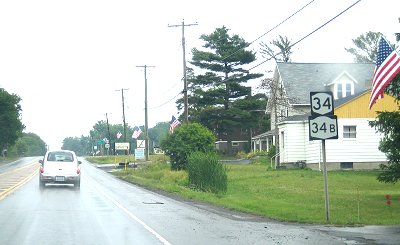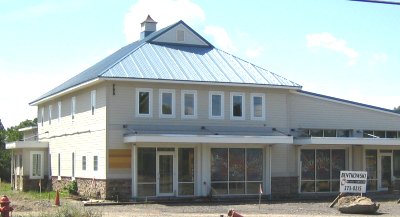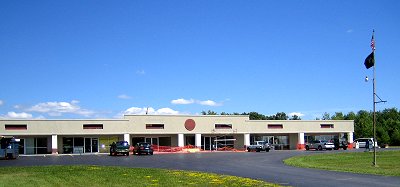- By Dan Veaner
- News
 Print
Print  No matter where you put a town center you are going to need infrastructure. People need water, electricity, sewer or septic or a package system, telephone, television. And these days, politicians are beginning to include Internet access in the list of essential infrastructure items. These are all comparatively easy in a city, but much harder in rural areas. In Lansing, a mix of suburban and rural living, it is easy in some areas and seemingly impossible in others.
No matter where you put a town center you are going to need infrastructure. People need water, electricity, sewer or septic or a package system, telephone, television. And these days, politicians are beginning to include Internet access in the list of essential infrastructure items. These are all comparatively easy in a city, but much harder in rural areas. In Lansing, a mix of suburban and rural living, it is easy in some areas and seemingly impossible in others.| Click here to read Part I Click here to read Part II | ||
Water may be the easy one. The Town of Lansing has an extensive water district. In several instances neighborhoods have decided they wanted municipal water and they petitioned the town to form a water district extension. If it proved to be fiscally feasible for the petitioning residents they were added to the system. This works best when the petitioning neighborhood is adjacent to existing water service. The idea is that the water district picks up neighboring areas until potentially the whole town is covered.

Could a town center go here?
Sewer is the tough one. The New York State Department of Environmental Conservation (DEC) has insisted the town participate in a shared municipal sewer plan that has turned out to be too expensive. As recently as last month they have refused to allow the Town to pursue a more reasonable plan that would include a stand-alone sewage treatment plant. The idea is that six municipalities share two sewage treatment plants in Cayuga Heights and Ithaca.
Political opposition to the shared resources plan from the Village of Lansing was fierce, because a trunk line would have had to be constructed along their streets to connect the Town to the nearest treatment plant. When the project was killed because it was just too expensive, Village officials didn't mourn it.
Now that Obama wants to spend money on infrastructure Town officials think there is a chance to get some of it for that original project in order to reduce the cost from approximately $900 per year to the $100 to $200 range. As recently as this week Town Supervisor Scott Pinney said that the project is 'shovel ready' -- just waiting for some way to fund it.
But after attending a Tompkins County Council Of Governments (TCCOG) meeting two weeks ago, Village Deputy Mayor Larry Fresinski said that the Village doesn't have anything to worry about as far as resurrecting the Town's sewer project is concerned.
"They've calculated that when all is said and done and all the mandates are taken out you've got $26 million left (for all of Tompkins County)," Fresinski said. "It's a good chunk of change, but any one project that's multi-million dollars wouldn't likely make it, because they're trying to spread it across so many categories."
Even if sewer never comes to the Town, there are other options. Package systems that are essentially shared septic systems could allow for denser development in limited areas such as a town center.

Or here?
Television and telephone are the easiest by far, because there are so many options for getting them these days. Gone are the days when the cable company had the monopoly on television and NYTEL was the only telephone provider. If you are lucky enough to have cable Internet you can get your telephone service very inexpensively. If not you can choose cellular phones, or traditionally wired phone service. Satellites provide television, radio, and Internet service. All of these options are already available in all locations that have been considered for a Lansing Town center.
That leaves high speed Internet access, especially in the rural parts of town where Verizon doesn't have the equipment to offer DSL and Time Warner Cable doesn't want to spend the dollars to run cable in areas they deem too underpopulated to pay.
Some Lansing people in that boat are getting Internet through their cellular phone providers, or via satellite. These aren't the fastest solutions, but they are better than dialup. The economic bailout may have something to offer. "I hope the interest is there," says former Town Supervisor Steve Farkas, who recently met Congressman Michael Arcuri along with a group of county legislators to talk about what monies might be available for. "It sounded like it is. It's long past due. We should have had it a long time ago."
Lansing's County Legislator Mike Sigler agrees. Sigler says there are at least a few ways Internet could be brought into our rural areas. "There are ways to do it now," he says. "There is a lot of dark fiber around. When fiber was cheap a lot of people were putting in fiber. Cornell has a lot of fiber. The County got a State grant for a $50,000 to $80,000 study on what fiber we have in the county. If we have enough we could make a ring of fiber. A couple of upstate counties are doing this."
Indeed they are. According to the NYS Legislative Commission on Rural Resources the Greene County Legislature awarded a $87,138 Quantum Fund loan to NYAir to help expand broadband wireless Internet coverage in underserved areas of the county. Genesee County is conducting a study to help encourage investment in fiber and wireless infrastructure and digital technologies. Suffolk County is developing a business plan to create a government-sponsored wireless network to serve 1.5 million residents, businesses, and visitors.

Or here?
On the community level the City of Utica is providing Internet access to small businesses. The Village of Frankfort in Herkimer County started offering a a community-wide wireless Internet access network last summer. Keene Valley School Enhancement Task Force recommended a Town-Wide Broadband Access Project last year to enhance their Adirondacks community.
And there are commercial options as well. Last April Finger Lakes Technologies Group's Peter Pizzutelli said that his company is laying new cable to supply trunk Internet access. He said that his company was considering laying such a line up route 34 toward Auburn, and that it could be possible for an enterprising local provider to tap into that line to provide wifi access in areas that can't get cable.
"Phone companies are mandated to provide phone service to every customer in our territory, but there is no mandate to provide high speed bandwidth for everybody," he said. "However New York State is starting to get proactive at priming the pump with funding to at least get the design started and the networks moved out into rural areas. We're trying to participate in that."
Sigler says that Tompkins County already has towers that could be used to provide wifi Internet access. "The County just spent $20 million putting up towers for the new emergency response system," he says. "We have line of sight everywhere in the county, so we should be able to put in wireless broadband on those towers. We would use those towers. We should be able to utilize that. It's going to cost some money to do, but we can make an argument that it's a worthy investment."
The upshot is that while it may be a bit piecemeal the infrastructure needed for a town center may already be here. Or if not actually here, there are enough options that Lansing could have a town center if and when the desire is strong enough. That will depend in part on how much traffic comes through the town to make shops viable, and on how well Lansing plans for development.
A traffic study showing 10,000 cars per day passing the corner of Triphammer and Peruville Roads suggests that the traffic may be approaching the point where a modest town center could be feasible, especially if a great breakfast place or other attraction that makes the center a place to stop and shop moved in.
As for planning, the Town has recently ramped up interest to the point of talking to an architectural firm that specializes in planning town centers. The Town is not quite to the point of hiring the firm for an initial study, but at last month's Town Board meeting town officials considered it.
That could mean that we could have a clearer picture of a future Lansing soon.
----
v5i7



